Norms and the Network: Journalism Ethics in a

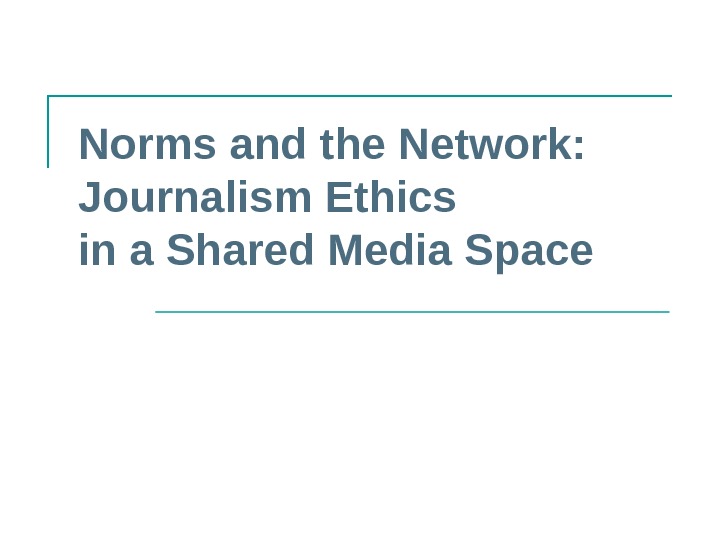
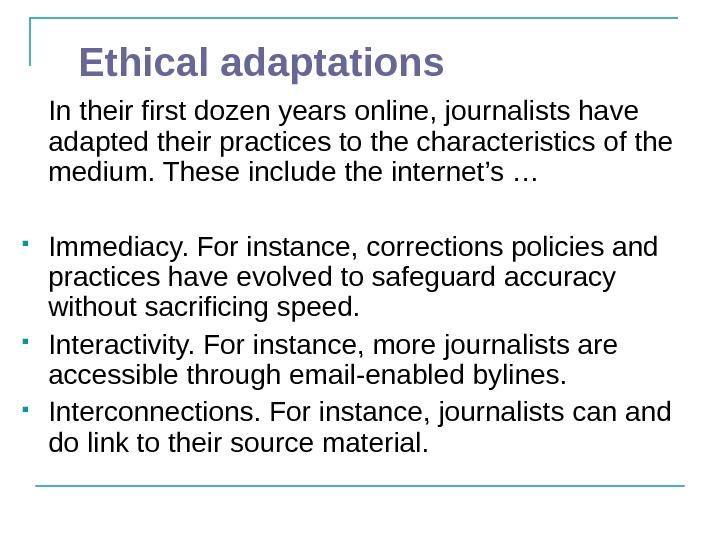
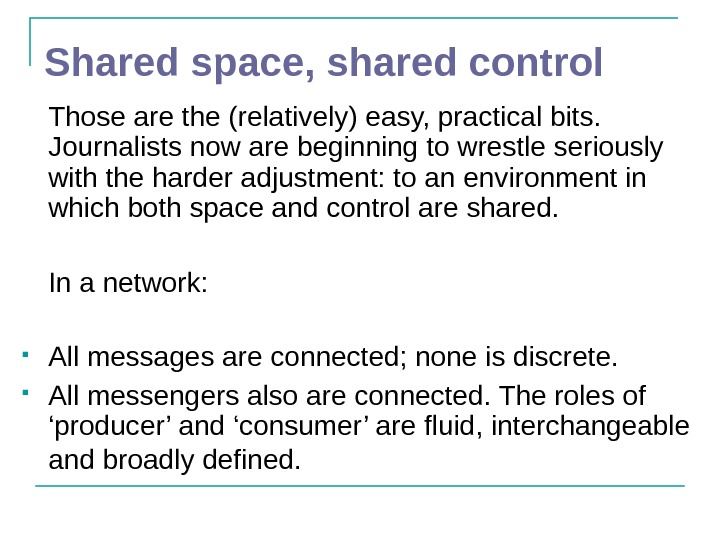

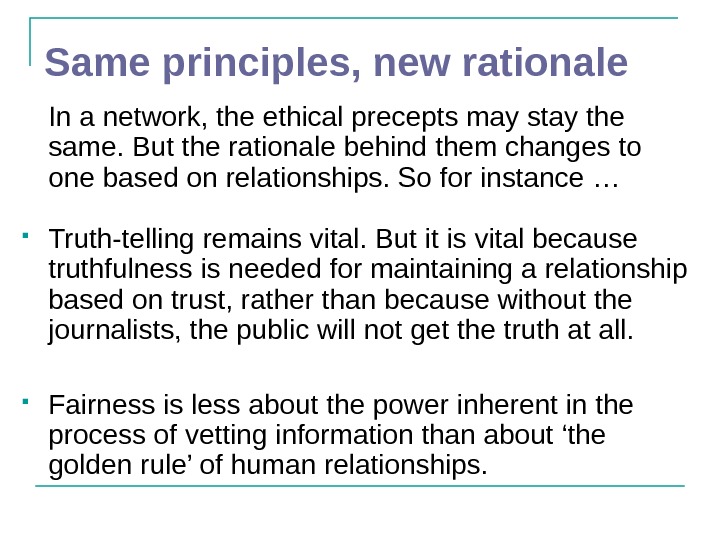
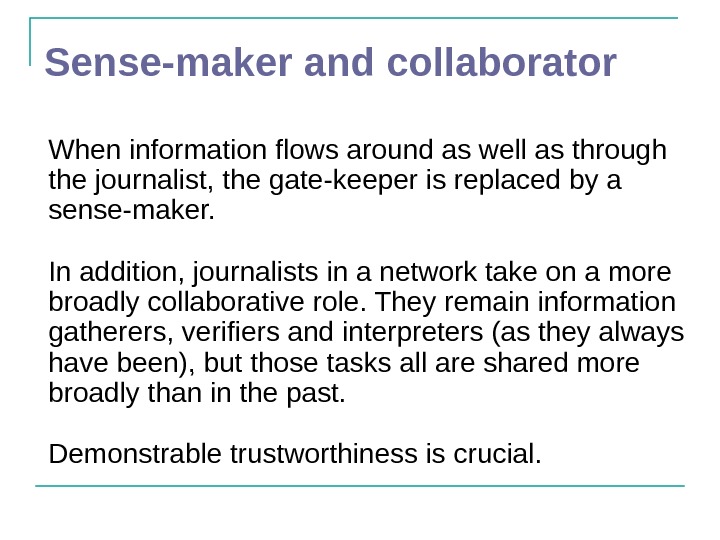
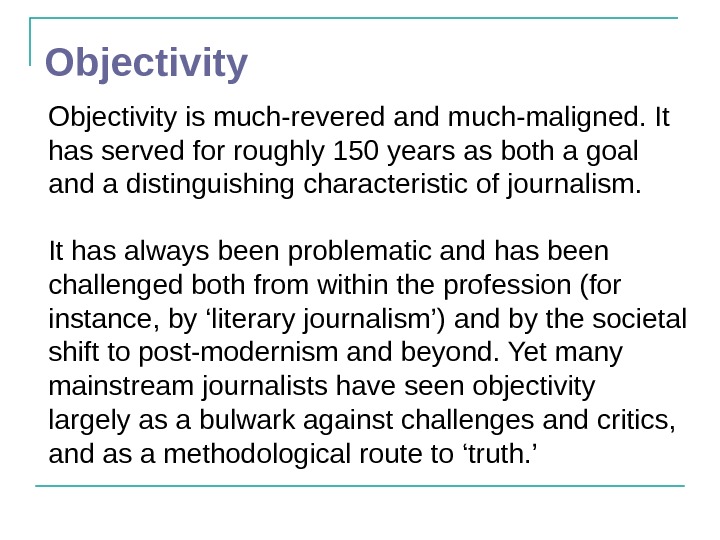

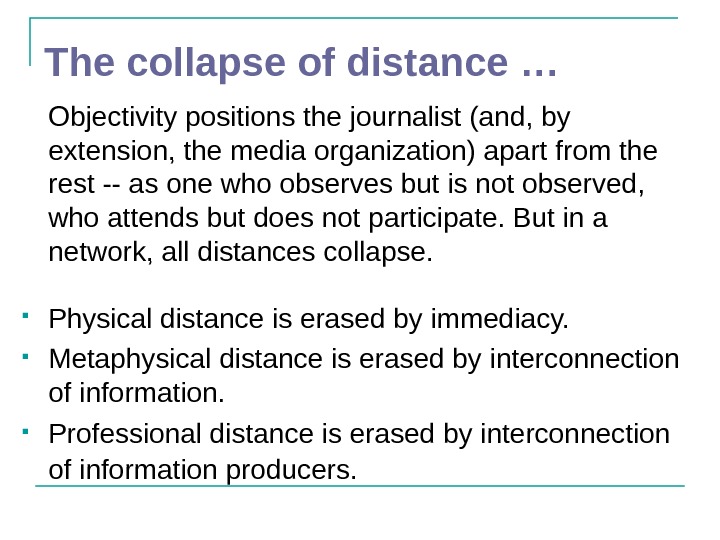
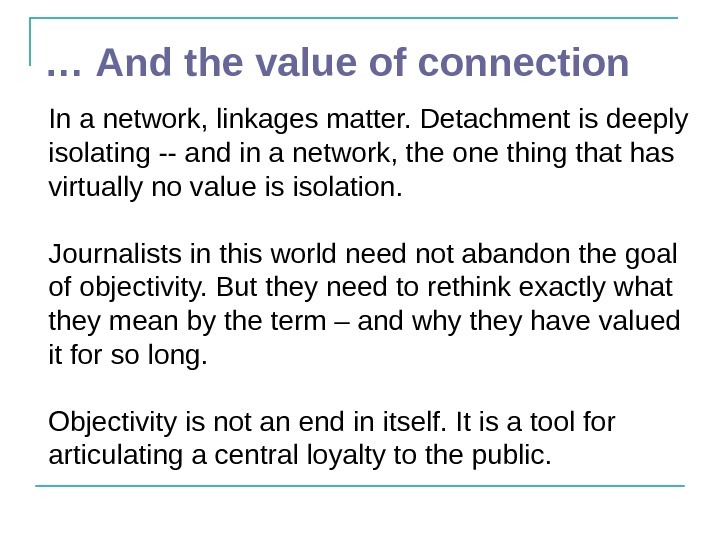



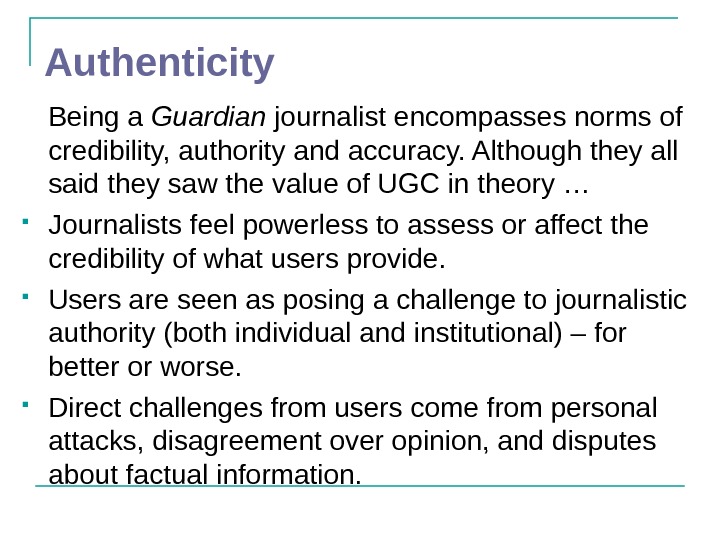
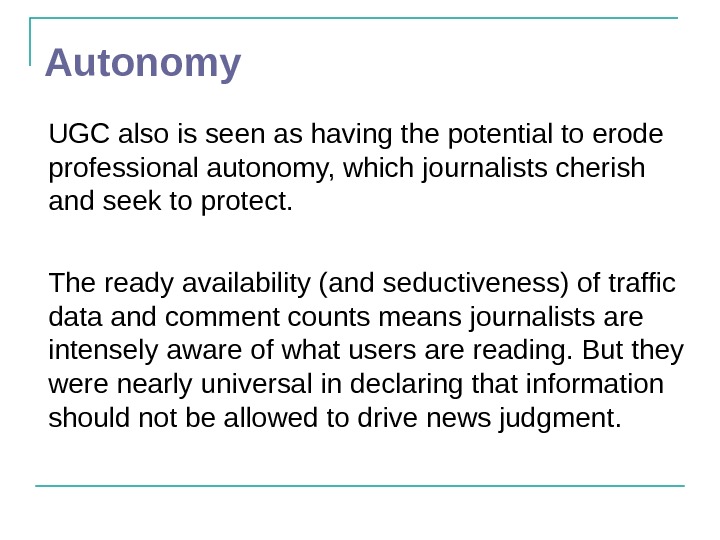
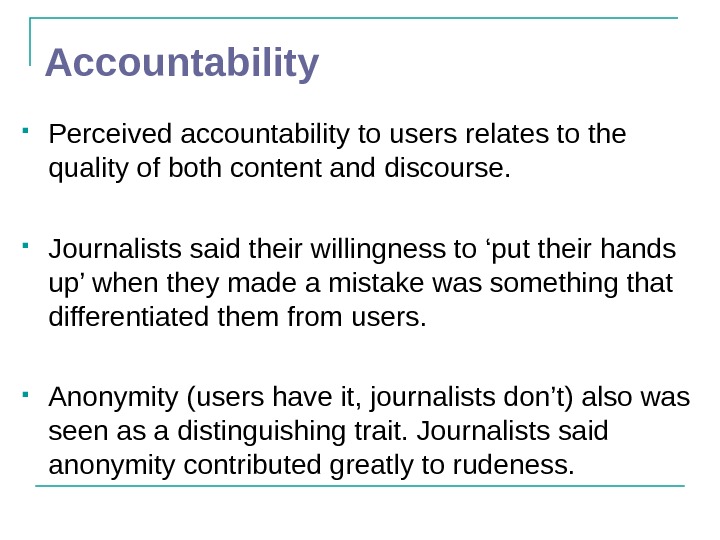
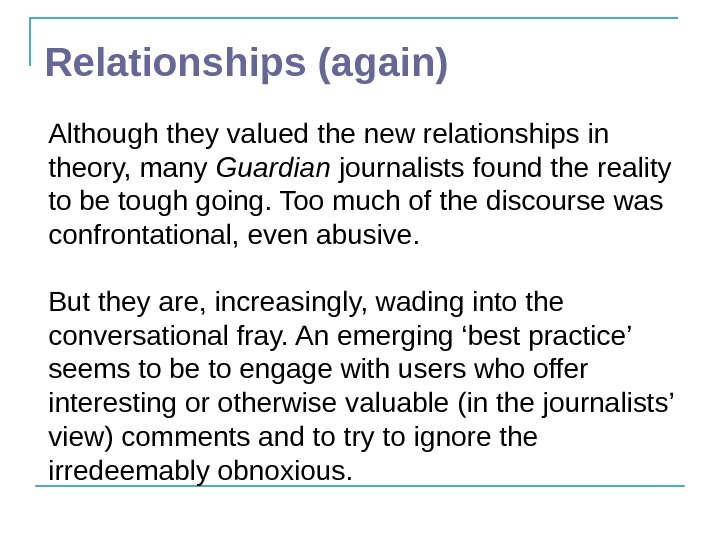
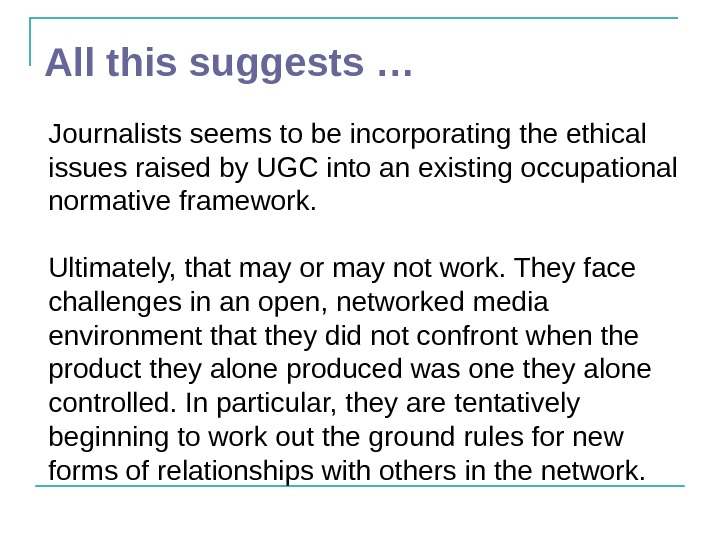
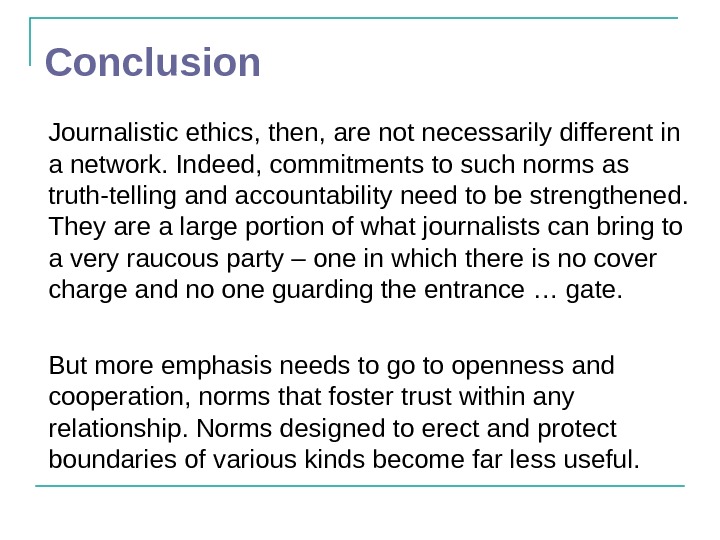
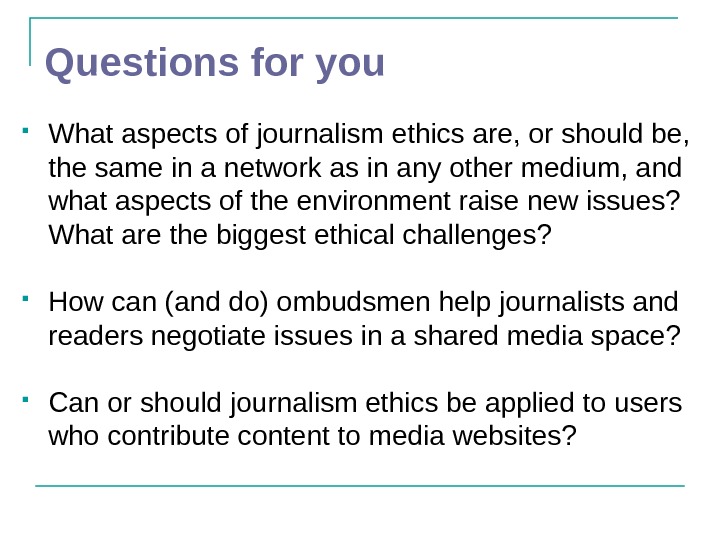
- Размер: 85.5 Кб
- Количество слайдов: 20
Описание презентации Norms and the Network: Journalism Ethics in a по слайдам
 Norms and the Network: Journalism Ethics in a Shared Media Space
Norms and the Network: Journalism Ethics in a Shared Media Space
 Ethical adaptations In their first dozen years online, journalists have adapted their practices to the characteristics of the medium. These include the internet’s … Immediacy. For instance, corrections policies and practices have evolved to safeguard accuracy without sacrificing speed. Interactivity. For instance, more journalists are accessible through email-enabled bylines. Interconnections. For instance, journalists can and do link to their source material.
Ethical adaptations In their first dozen years online, journalists have adapted their practices to the characteristics of the medium. These include the internet’s … Immediacy. For instance, corrections policies and practices have evolved to safeguard accuracy without sacrificing speed. Interactivity. For instance, more journalists are accessible through email-enabled bylines. Interconnections. For instance, journalists can and do link to their source material.
 Shared space, shared control Those are the (relatively) easy, practical bits. Journalists now are beginning to wrestle seriously with the harder adjustment: to an environment in which both space and control are shared. In a network: All messages are connected; none is discrete. All messengers also are connected. The roles of ‘producer’ and ‘consumer’ are fluid, interchangeable and broadly defined.
Shared space, shared control Those are the (relatively) easy, practical bits. Journalists now are beginning to wrestle seriously with the harder adjustment: to an environment in which both space and control are shared. In a network: All messages are connected; none is discrete. All messengers also are connected. The roles of ‘producer’ and ‘consumer’ are fluid, interchangeable and broadly defined.
 Gate-keeping norms Journalistic ethics have been codified in an ‘journalist as gate-keeper’ environment. Norms are designed to establish and maintain trust in the person and/or institution guarding the gate. Journalists see the role (and themselves) as central to democracy: as the providers of information that citizens need to be free and self-governing. Without the ethical journalist, in this view, democracy is ill-served because MISinformation or DISinformation can and will pass through the gate.
Gate-keeping norms Journalistic ethics have been codified in an ‘journalist as gate-keeper’ environment. Norms are designed to establish and maintain trust in the person and/or institution guarding the gate. Journalists see the role (and themselves) as central to democracy: as the providers of information that citizens need to be free and self-governing. Without the ethical journalist, in this view, democracy is ill-served because MISinformation or DISinformation can and will pass through the gate.
 Same principles, new rationale In a network, the ethical precepts may stay the same. But the rationale behind them changes to one based on relationships. So for instance … Truth-telling remains vital. But it is vital because truthfulness is needed for maintaining a relationship based on trust, rather than because without the journalists, the public will not get the truth at all. Fairness is less about the power inherent in the process of vetting information than about ‘the golden rule’ of human relationships.
Same principles, new rationale In a network, the ethical precepts may stay the same. But the rationale behind them changes to one based on relationships. So for instance … Truth-telling remains vital. But it is vital because truthfulness is needed for maintaining a relationship based on trust, rather than because without the journalists, the public will not get the truth at all. Fairness is less about the power inherent in the process of vetting information than about ‘the golden rule’ of human relationships.
 Sense-maker and collaborator When information flows around as well as through the journalist, the gate-keeper is replaced by a sense-maker. In addition, journalists in a network take on a more broadly collaborative role. They remain information gatherers, verifiers and interpreters (as they always have been), but those tasks all are shared more broadly than in the past. Demonstrable trustworthiness is crucial.
Sense-maker and collaborator When information flows around as well as through the journalist, the gate-keeper is replaced by a sense-maker. In addition, journalists in a network take on a more broadly collaborative role. They remain information gatherers, verifiers and interpreters (as they always have been), but those tasks all are shared more broadly than in the past. Demonstrable trustworthiness is crucial.
 Objectivity is much-revered and much-maligned. It has served for roughly 150 years as both a goal and a distinguishing characteristic of journalism. It has always been problematic and has been challenged both from within the profession (for instance, by ‘literary journalism’) and by the societal shift to post-modernism and beyond. Yet many mainstream journalists have seen objectivity largely as a bulwark against challenges and critics, and as a methodological route to ‘truth. ’
Objectivity is much-revered and much-maligned. It has served for roughly 150 years as both a goal and a distinguishing characteristic of journalism. It has always been problematic and has been challenged both from within the profession (for instance, by ‘literary journalism’) and by the societal shift to post-modernism and beyond. Yet many mainstream journalists have seen objectivity largely as a bulwark against challenges and critics, and as a methodological route to ‘truth. ’
 Objectivity in the network Claims about the ‘objective’ nature of any given story become problematic: Every story is part of a fluid, seamless, intrinsically intertwined whole. It is neither finite nor final – and ultimately not controlled by the journalist. Tools for locating and retrieving disaggregated info mean a personalized context for seeing the story. Nor is the journalist’s aura of detachment from both sources and readers, which objectivity requires, easy to sustain in an interconnected world.
Objectivity in the network Claims about the ‘objective’ nature of any given story become problematic: Every story is part of a fluid, seamless, intrinsically intertwined whole. It is neither finite nor final – and ultimately not controlled by the journalist. Tools for locating and retrieving disaggregated info mean a personalized context for seeing the story. Nor is the journalist’s aura of detachment from both sources and readers, which objectivity requires, easy to sustain in an interconnected world.
 The collapse of distance … Objectivity positions the journalist (and, by extension, the media organization) apart from the rest — as one who observes but is not observed, who attends but does not participate. But in a network, all distances collapse. Physical distance is erased by immediacy. Metaphysical distance is erased by interconnection of information. Professional distance is erased by interconnection of information producers.
The collapse of distance … Objectivity positions the journalist (and, by extension, the media organization) apart from the rest — as one who observes but is not observed, who attends but does not participate. But in a network, all distances collapse. Physical distance is erased by immediacy. Metaphysical distance is erased by interconnection of information. Professional distance is erased by interconnection of information producers.
 … And the value of connection In a network, linkages matter. Detachment is deeply isolating — and in a network, the one thing that has virtually no value is isolation. Journalists in this world need not abandon the goal of objectivity. But they need to rethink exactly what they mean by the term – and why they have valued it for so long. Objectivity is not an end in itself. It is a tool for articulating a central loyalty to the public.
… And the value of connection In a network, linkages matter. Detachment is deeply isolating — and in a network, the one thing that has virtually no value is isolation. Journalists in this world need not abandon the goal of objectivity. But they need to rethink exactly what they mean by the term – and why they have valued it for so long. Objectivity is not an end in itself. It is a tool for articulating a central loyalty to the public.
 Transparency I was just at a conference where a colleague, Michael Karlsson, talked about transparency as a potential replacement for objectivity in the pantheon of core journalistic ethics. ‘ Transparency’ entails conveying as much as possible about the people, processes and products that shape information – including the journalist. As ombudsmen, you seem likely to play (or continue playing) a key role in that process.
Transparency I was just at a conference where a colleague, Michael Karlsson, talked about transparency as a potential replacement for objectivity in the pantheon of core journalistic ethics. ‘ Transparency’ entails conveying as much as possible about the people, processes and products that shape information – including the journalist. As ombudsmen, you seem likely to play (or continue playing) a key role in that process.
 In real life … Earlier this year, Ian Ashman and I talked with print and online journalists at the Guardian in the UK about how they are assessing and incorporating user-generated content (UGC) in their ethical perceptions and practices. We focused on the journalistic norms of: Authenticity (associated with credibility). Autonomy. Accountability / responsibility.
In real life … Earlier this year, Ian Ashman and I talked with print and online journalists at the Guardian in the UK about how they are assessing and incorporating user-generated content (UGC) in their ethical perceptions and practices. We focused on the journalistic norms of: Authenticity (associated with credibility). Autonomy. Accountability / responsibility.
 Core values, key issues Although the study rests primarily on interviews, we also included a little questionnaire. We found: Accuracy was central to their perceptions about ethical journalism. Other core values included independence, honesty and balance / fairness. Asked to identify and describe key ethical issues related to UGC, journalists focused mainly on credibility and civility … both of which they thought were potentially undermined by UGC.
Core values, key issues Although the study rests primarily on interviews, we also included a little questionnaire. We found: Accuracy was central to their perceptions about ethical journalism. Other core values included independence, honesty and balance / fairness. Asked to identify and describe key ethical issues related to UGC, journalists focused mainly on credibility and civility … both of which they thought were potentially undermined by UGC.
 Authenticity Being a Guardian journalist encompasses norms of credibility, authority and accuracy. Although they all said they saw the value of UGC in theory … Journalists feel powerless to assess or affect the credibility of what users provide. Users are seen as posing a challenge to journalistic authority (both individual and institutional) – for better or worse. Direct challenges from users come from personal attacks, disagreement over opinion, and disputes about factual information.
Authenticity Being a Guardian journalist encompasses norms of credibility, authority and accuracy. Although they all said they saw the value of UGC in theory … Journalists feel powerless to assess or affect the credibility of what users provide. Users are seen as posing a challenge to journalistic authority (both individual and institutional) – for better or worse. Direct challenges from users come from personal attacks, disagreement over opinion, and disputes about factual information.
 Autonomy UGC also is seen as having the potential to erode professional autonomy, which journalists cherish and seek to protect. The ready availability (and seductiveness) of traffic data and comment counts means journalists are intensely aware of what users are reading. But they were nearly universal in declaring that information should not be allowed to drive news judgment.
Autonomy UGC also is seen as having the potential to erode professional autonomy, which journalists cherish and seek to protect. The ready availability (and seductiveness) of traffic data and comment counts means journalists are intensely aware of what users are reading. But they were nearly universal in declaring that information should not be allowed to drive news judgment.
 Accountability Perceived accountability to users relates to the quality of both content and discourse. Journalists said their willingness to ‘put their hands up’ when they made a mistake was something that differentiated them from users. Anonymity (users have it, journalists don’t) also was seen as a distinguishing trait. Journalists said anonymity contributed greatly to rudeness.
Accountability Perceived accountability to users relates to the quality of both content and discourse. Journalists said their willingness to ‘put their hands up’ when they made a mistake was something that differentiated them from users. Anonymity (users have it, journalists don’t) also was seen as a distinguishing trait. Journalists said anonymity contributed greatly to rudeness.
 Relationships (again) Although they valued the new relationships in theory, many Guardian journalists found the reality to be tough going. Too much of the discourse was confrontational, even abusive. But they are, increasingly, wading into the conversational fray. An emerging ‘best practice’ seems to be to engage with users who offer interesting or otherwise valuable (in the journalists’ view) comments and to try to ignore the irredeemably obnoxious.
Relationships (again) Although they valued the new relationships in theory, many Guardian journalists found the reality to be tough going. Too much of the discourse was confrontational, even abusive. But they are, increasingly, wading into the conversational fray. An emerging ‘best practice’ seems to be to engage with users who offer interesting or otherwise valuable (in the journalists’ view) comments and to try to ignore the irredeemably obnoxious.
 All this suggests … Journalists seems to be incorporating the ethical issues raised by UGC into an existing occupational normative framework. Ultimately, that may or may not work. They face challenges in an open, networked media environment that they did not confront when the product they alone produced was one they alone controlled. In particular, they are tentatively beginning to work out the ground rules for new forms of relationships with others in the network.
All this suggests … Journalists seems to be incorporating the ethical issues raised by UGC into an existing occupational normative framework. Ultimately, that may or may not work. They face challenges in an open, networked media environment that they did not confront when the product they alone produced was one they alone controlled. In particular, they are tentatively beginning to work out the ground rules for new forms of relationships with others in the network.
 Conclusion Journalistic ethics, then, are not necessarily different in a network. Indeed, commitments to such norms as truth-telling and accountability need to be strengthened. They are a large portion of what journalists can bring to a very raucous party – one in which there is no cover charge and no one guarding the entrance … gate. But more emphasis needs to go to openness and cooperation, norms that foster trust within any relationship. Norms designed to erect and protect boundaries of various kinds become far less useful.
Conclusion Journalistic ethics, then, are not necessarily different in a network. Indeed, commitments to such norms as truth-telling and accountability need to be strengthened. They are a large portion of what journalists can bring to a very raucous party – one in which there is no cover charge and no one guarding the entrance … gate. But more emphasis needs to go to openness and cooperation, norms that foster trust within any relationship. Norms designed to erect and protect boundaries of various kinds become far less useful.
 Questions for you What aspects of journalism ethics are, or should be, the same in a network as in any other medium, and what aspects of the environment raise new issues? What are the biggest ethical challenges? How can (and do) ombudsmen help journalists and readers negotiate issues in a shared media space? Can or should journalism ethics be applied to users who contribute content to media websites?
Questions for you What aspects of journalism ethics are, or should be, the same in a network as in any other medium, and what aspects of the environment raise new issues? What are the biggest ethical challenges? How can (and do) ombudsmen help journalists and readers negotiate issues in a shared media space? Can or should journalism ethics be applied to users who contribute content to media websites?

